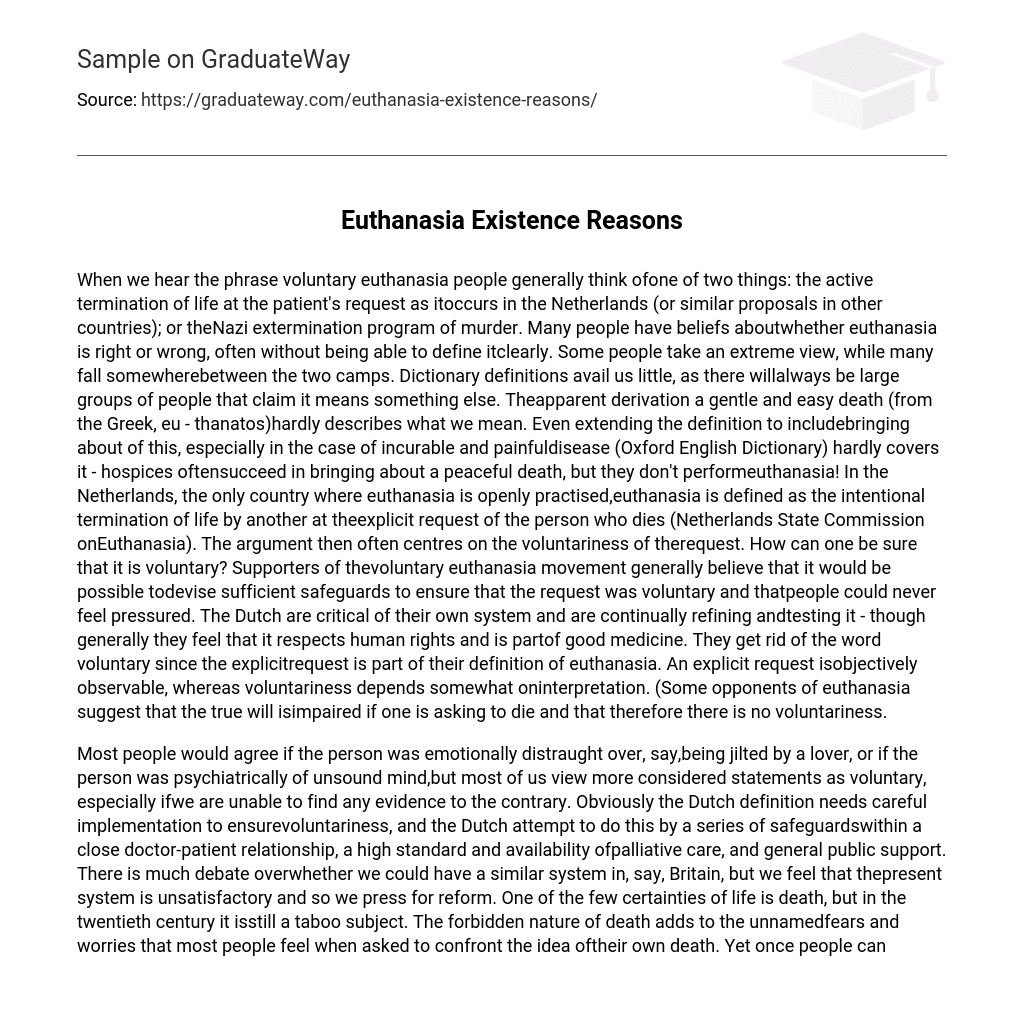When we hear the phrase voluntary euthanasia people generally think ofone of two things: the active termination of life at the patient’s request as itoccurs in the Netherlands (or similar proposals in other countries); or theNazi extermination program of murder. Many people have beliefs aboutwhether euthanasia is right or wrong, often without being able to define itclearly. Some people take an extreme view, while many fall somewherebetween the two camps. Dictionary definitions avail us little, as there willalways be large groups of people that claim it means something else. Theapparent derivation a gentle and easy death (from the Greek, eu – thanatos)hardly describes what we mean. Even extending the definition to includebringing about of this, especially in the case of incurable and painfuldisease (Oxford English Dictionary) hardly covers it – hospices oftensucceed in bringing about a peaceful death, but they don’t performeuthanasia! In the Netherlands, the only country where euthanasia is openly practised,euthanasia is defined as the intentional termination of life by another at theexplicit request of the person who dies (Netherlands State Commission onEuthanasia). The argument then often centres on the voluntariness of therequest. How can one be sure that it is voluntary? Supporters of thevoluntary euthanasia movement generally believe that it would be possible todevise sufficient safeguards to ensure that the request was voluntary and thatpeople could never feel pressured. The Dutch are critical of their own system and are continually refining andtesting it – though generally they feel that it respects human rights and is partof good medicine. They get rid of the word voluntary since the explicitrequest is part of their definition of euthanasia. An explicit request isobjectively observable, whereas voluntariness depends somewhat oninterpretation. (Some opponents of euthanasia suggest that the true will isimpaired if one is asking to die and that therefore there is no voluntariness.
Most people would agree if the person was emotionally distraught over, say,being jilted by a lover, or if the person was psychiatrically of unsound mind,but most of us view more considered statements as voluntary, especially ifwe are unable to find any evidence to the contrary. Obviously the Dutch definition needs careful implementation to ensurevoluntariness, and the Dutch attempt to do this by a series of safeguardswithin a close doctor-patient relationship, a high standard and availability ofpalliative care, and general public support. There is much debate overwhether we could have a similar system in, say, Britain, but we feel that thepresent system is unsatisfactory and so we press for reform. One of the few certainties of life is death, but in the twentieth century it isstill a taboo subject. The forbidden nature of death adds to the unnamedfears and worries that most people feel when asked to confront the idea oftheir own death. Yet once people can overcome their reluctance to discussthe subject, most often what is revealed is not the fear of death itself, but themanner of dying. The difficulty of thinking about death with dignity is thatit implies that one day you, or someone you love, may be in a position towant that choice. No one can prevent death finally, but we can and should ensure that thedying process is a gentle and peaceful one. When life consists of a fewagonising, drugged weeks, many patients beg their doctors to help them die,and many doctors, mindful of the ethics of their profession, feel forced torefuse. Those who, out of compassion, accede to such a request, know theyare breaking the law and putting their careers at risk. This is the dilemma which faces all of us now. Should we, as potentialpatients, have the legal right to ask our doctors to help us die when the endof life is in sight and our suffering severe?Did Dr. Kevorkian go too far in portraying Youk’s death on national TV? Dr. Kevorkian brought the issue of death into the homes of millions of Americans. Death has alwaysbeen a major taboo unless it is portrayed through Hollywood’s violent disregard for human life. Mr.
Youk’s death was a peaceful, and dignified one. Most Americans are not given the choice to havesuch a gentle death. Many patients die slowly, extremely sedated, incompetent and incontinent or bychoosing to hasten their death by refusing food and hydration. Mr. Youk received quality hospicecare and chose a peaceful ending. The choice that Thomas Youk made should be a choice thateveryone has available to discuss with his or her families and make by their own accordPhilosophy Essays





